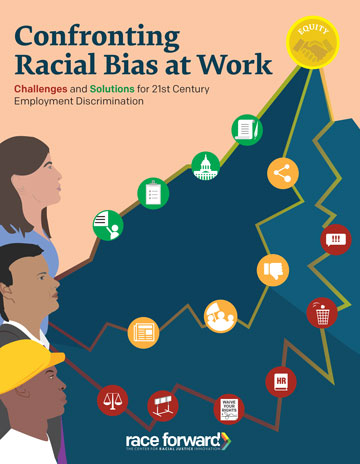Confronting Racial Bias at Work
More than 50 years after the passage of Title VII of the Civil Rights Act of 1964, racial discrimination in workplaces is commonplace, and threatens to worsen given the racist rhetoric espoused during the president-elect's campaign and the corresponding behavior it sanctions. The anti-government regulation approach to the economy typical of the current congressional leadership and their disdain for so-called "political correctness" are also likely to signal increased challenges to fairness for workers.
Published the week of the 2016 presidential election, Confronting Racial Bias at Work: Challenges and Solutions for 21st Century Employment Discrimination reviews the systemic barriers impacting workers of color drawing upon academic research, interviews with discrimination lawyers and EEOC officials, and surveys of worker advocates.

The report argues that we must not only reinforce the largely reactive anti-discrimination structure established by law so that it reaches more workers and protects them more effectively, we must also promote proactive systemic solutions to increase the pressures, incentives, and mandates for racially equitable outcomes in employment.
Confronting Racial Bias at Work is presented in four parts:
- Part One covers the legislative origins of the Equal Employment Opportunity Commission (EEOC), the federal agency created by Title VII in the 1960s to protect workers against intentional discrimination.
- Part Two describes the difference between how workers’ racial discrimination claims are supposed to operate in theory within our federal courts and bureaucracies, and the extremely challenging way that they operate in practice — particularly if the discrimination is not of an explicit or intentional variety.
- Part Three profiles recent campaigns from three resourceful worker organizations that — in order to make significant progress challenging employment discrimination and promoting racially equitable outcomes — have felt forced to work largely outside of the slow and limited legal and administrative systems established by Title VII.
- Part Four presents systemic solutions and recommendations for what our nation needs now and in the future to secure fairness and racially equitable outcomes for workers of color.
See press release here.
Download the Executive Summary
Acknowledgments:
Funding and Partner Organizations: W.K. Kellogg Foundation, NoVo Foundation, Embrey Family Foundation, Moriah Fund, Surdna Foundation
Featured Organization Representatives: Mahoma Lopez, Co-Executive Director, Laundry Workers Center; Lola Smallwood Cuevas, Co-Founder, Los Angeles Black Worker Center; Natalicia Tracy, Executive Director, Brazilian Immigrant Center
Public servants at the EEOC: Evangeline Hawthorne, National Outreach Coordinator; Ronald Edwards, Director, Program Research and Surveys Division; Michael Rojas, Outreach Program Coordinator, New York District Office; William R. Tamayo, District Director, San Francisco District Office
